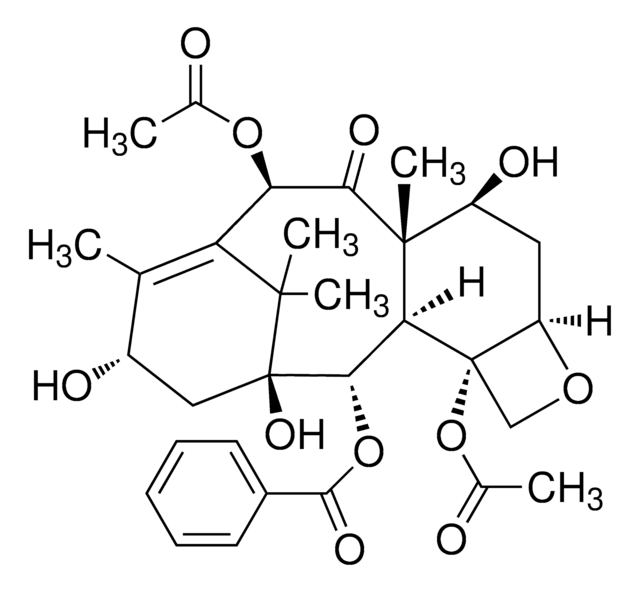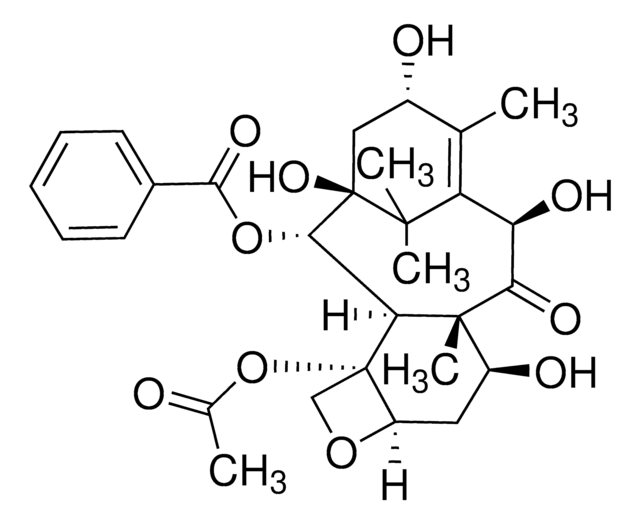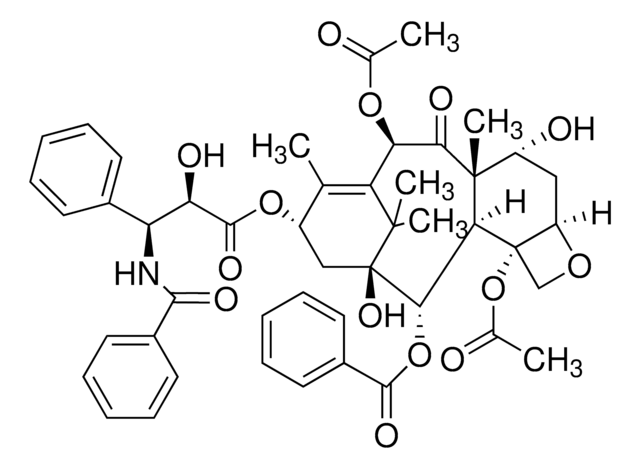D3676
10-Deacetylbaccatin III from Taxus baccata
≥95% (HPLC)
About This Item
Recommended Products
biological source
Taxus baccata
Quality Level
Assay
≥95% (HPLC)
form
solid
mol wt
544.59 g/mol
color
white
solubility
methanol: soluble, clear, colorless (5 mg + 0.1 mL MeOH)
antibiotic activity spectrum
neoplastics
Mode of action
DNA synthesis | interferes
storage temp.
2-8°C
SMILES string
[H][C@@]12C[C@H](O)[C@@]3(C)C(=O)[C@H](O)C4=C(C)[C@@H](O)C[C@@](O)([C@@H](OC(=O)c5ccccc5)[C@]3([H])[C@@]1(CO2)OC(C)=O)C4(C)C
InChI
1S/C29H36O10/c1-14-17(31)12-29(36)24(38-25(35)16-9-7-6-8-10-16)22-27(5,23(34)21(33)20(14)26(29,3)4)18(32)11-19-28(22,13-37-19)39-15(2)30/h6-10,17-19,21-22,24,31-33,36H,11-13H2,1-5H3/t17-,18-,19+,21+,22-,24-,27+,28-,29+/m0/s1
InChI key
YWLXLRUDGLRYDR-ZHPRIASZSA-N
Looking for similar products? Visit Product Comparison Guide
Application
Biochem/physiol Actions
Signal Word
Danger
Hazard Statements
Precautionary Statements
Hazard Classifications
Carc. 1B - Eye Irrit. 2 - Muta. 1B - Skin Irrit. 2 - STOT RE 2 - STOT SE 3
Target Organs
Respiratory system
Storage Class Code
6.1C - Combustible acute toxic Cat.3 / toxic compounds or compounds which causing chronic effects
WGK
WGK 3
Flash Point(F)
Not applicable
Flash Point(C)
Not applicable
Personal Protective Equipment
Regulatory Listings
Regulatory Listings are mainly provided for chemical products. Only limited information can be provided here for non-chemical products. No entry means none of the components are listed. It is the user’s obligation to ensure the safe and legal use of the product.
JAN Code
D3676-5MG:
D3676-BULK:
D3676-VAR:
D3676-1MG:
D3676-25MG:
Certificates of Analysis (COA)
Search for Certificates of Analysis (COA) by entering the products Lot/Batch Number. Lot and Batch Numbers can be found on a product’s label following the words ‘Lot’ or ‘Batch’.
Already Own This Product?
Find documentation for the products that you have recently purchased in the Document Library.
Our team of scientists has experience in all areas of research including Life Science, Material Science, Chemical Synthesis, Chromatography, Analytical and many others.
Contact Technical Service







